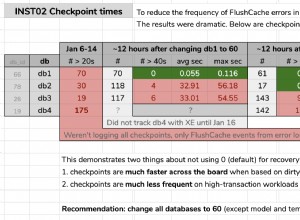J'ai fini par utiliser le le blog d'Andre Dunstan et cette réponse SO qui dit de formater le json d'une manière spécifique pour utiliser la commande de copie.
Étant donné que ma structure est assez définie pour les fichiers que j'analyse, je me suis retrouvé avec le script suivant.
def file_len(fname):
# to find the number of lines in the file.
# Has been pretty efficient even for millions of records
with open(fname) as f:
for i, l in enumerate(f):
pass
return i + 1
INPUTFILE = '/path/to/input.json'
OUTPUTFILE = '/path/to/output.json.csv'
LEN = file_len(INPUTFILE)
with open(OUTPUTFILE, 'w') as fo:
with open(INPUTFILE, 'r') as fi:
for i, l in enumerate(fi):
# I skip the first line
if i == 0: continue
# To remove the ']}}' from the end
elif i+1 == LEN: _ = fo.write(l[:-3])
# To remove the ',' from the end
# and add \n since write does not add newline on its own
else: _ = fo.write(l[:-2]+'\n')
# load statement
import sqlalchemy
POSTGRESQL = f'postgresql+psycopg2://{USERNAME}:{PASSWORD}@{HOSTNAME}/{DB}'
engine = sqlalchemy.create_engine(POSTGRESQL, echo=True)
con = engine.connect()
trans = con.begin()
LOAD_SQL = f"COPY tablename from '{OUTPUTFILE}' with csv delimiter E'\x01' quote E'\x02' null as '';"
try:
con.execute(LOAD_SQL)
trans.commit()
except Exception as e:
trans.rollback()
finally:
con.close()




